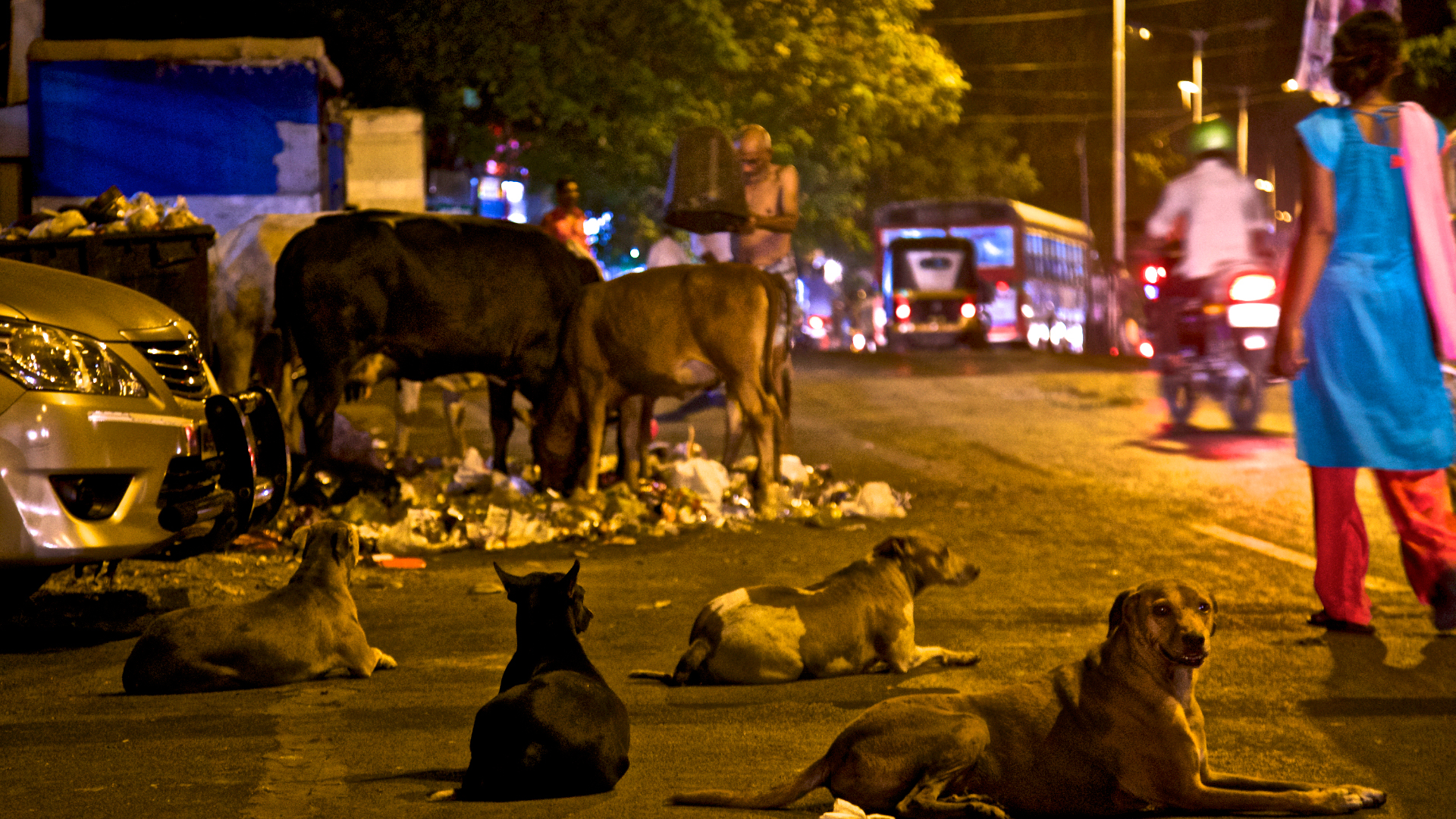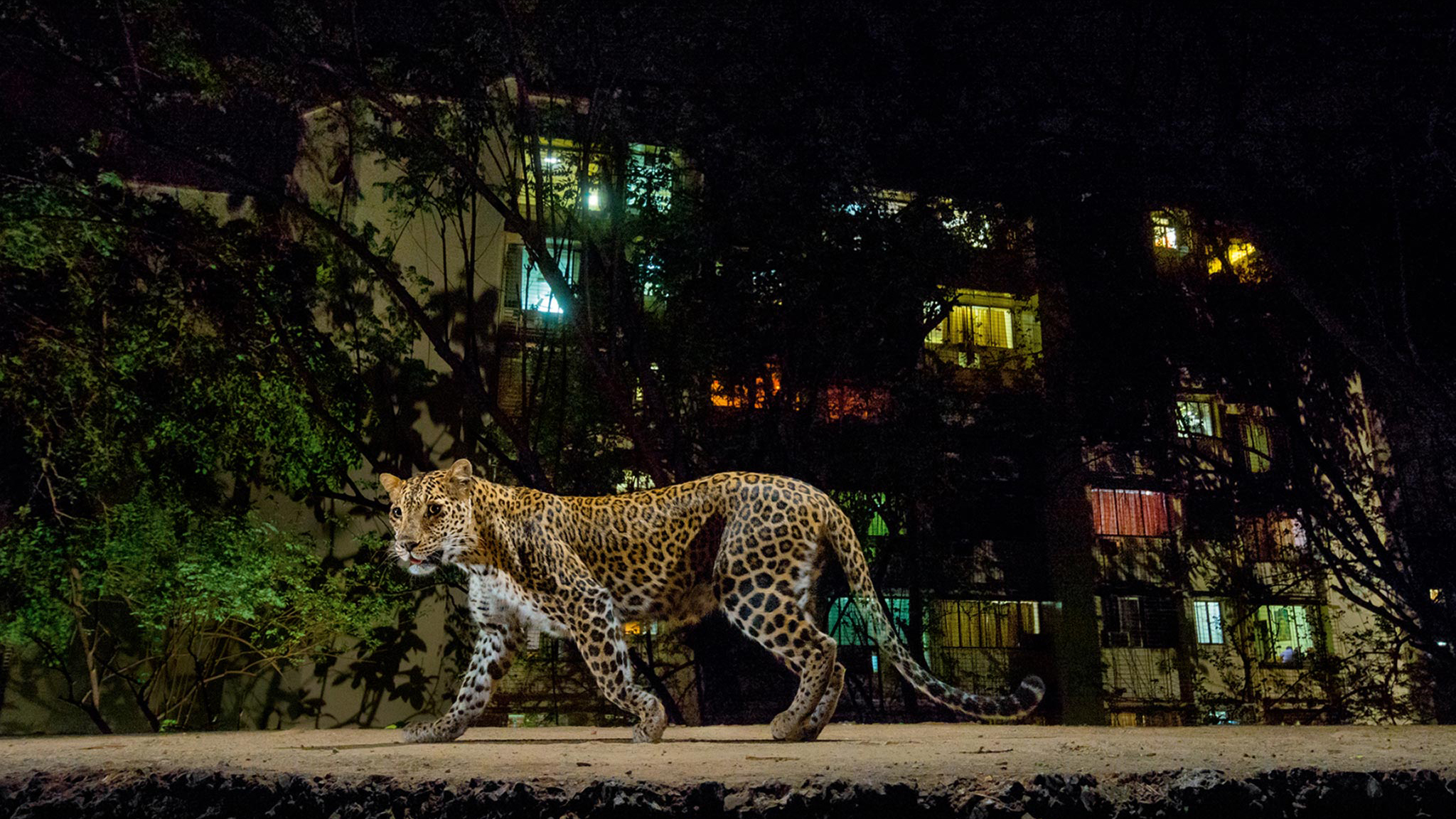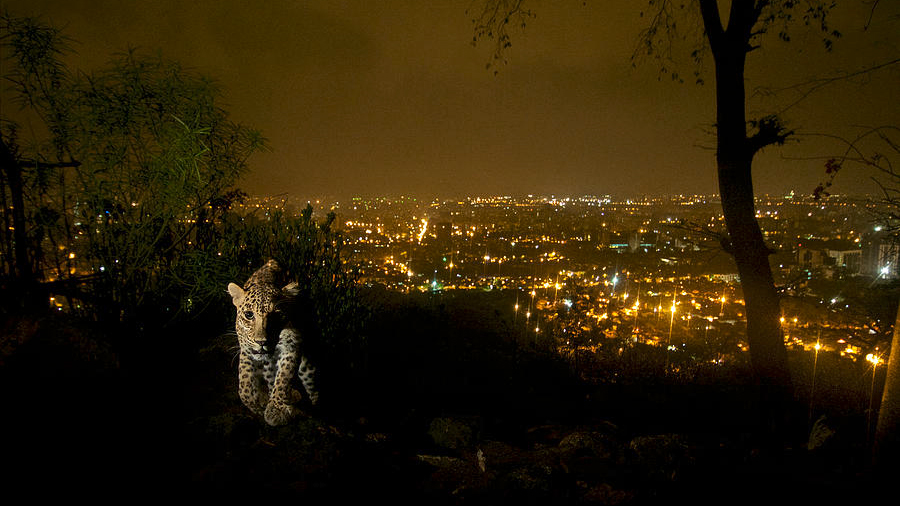Having a leopard in the neighborhood may seem a terrifying prospect, but the reality is that large predator may save your life.
A new study published in the journal Frontiers in Ecology and the Environment suggests that leopards in Mumbai, the world’s sixth most-populated city, may save human lives by feeding on feral dogs. Feral dogs are a major health issue in India, where they are the leading cause of rabies deaths.
The study was led by researchers from the University of Queensland School of Earth and Environmental Sciences.
Sanjay Gandhi National Park, with a population of 35 leopards, has the densest population of these big cats in the world. The park is also in the middle of the burgeoning city of Mumbai, with more than 20 million people. Approximately 350,000 people, many of them in poverty, live all along the periphery of the small national park. Leopards can be seen strolling the city streets, and hunting in parking garages.
“While leopards are often in conflict with people over livestock like cattle and sheep and are frequently persecuted throughout their range, we show that these unique predators can also be beneficial to human society,” says Christopher O’Bryan, one of the joint lead authors on the study, and a PhD student at the University of Queensland.
That’s because 40 percent of the average leopard’s diet consists of feral or stray dogs, the researchers found. The density of feral dogs in and around the national park is an average of 17 dogs per square kilometer compared to other parts of Mumbai away from the park boundary that can have upwards of 680 dogs per square kilometer.

India’s rising feral dog population causes a major health crisis in the country. While exact population figures are difficult to verify, many sources estimate 30 million stray dogs live in India. Approximately 20,000 people per year die of rabies, most of them due to dog bites.
The study found that the small population of leopards “may consume about 1,500 dogs per year, saving around 1,000 bite incidents and 90 potential rabies cases.” The presence of leopards was also estimated to save $18,000 in dog management costs.
“Dog bites in these slums are very costly to people,” O’Bryan told me in a Skype interview. “There are the costs for medical treatments and hospitalization, as well as the costs associated with lost work time.”
O’Bryan is quick to point out that living with leopards has its own risks and costs. In 2017, there were seven leopard attacks in the area. “A lot of the news coverage focuses solely on the negatives of the leopards,” says O’Bryan. “The leopards can certainly be a health hazard. We are suggesting that they may also be a health benefit. We believe it’s important to assess both the costs and benefits associated with living in close proximity to predators.”
This study is a notable departure from usual studies on the benefits of large carnivores, which usually focus on predator effects in large national parks and protected areas. The classic example is research on the ecological benefits of wolves in Yellowstone National Park, which has shown that reintroducing these predators has had a host of cascading effects, including causing changes in elk behavior that leads to revegetation of native plants along streams.

That study, and others like it, focus on the benefits to the park’s ecosystem. “This leopard study may be the first research that looks at a large predator’s effect on human health and well-being,” O’Bryan says.
Around the globe, expanding human populations encroach on predator habitat. This is often portrayed solely in terms of conflict. Many predators are forced to adapt to what is essentially a new ecosystem. Instead of preying on just native Indian mammal species, the urban leopards hunt feral dogs.
Leopards are widespread and adaptable, but they have disappeared from nearly 80 percent of their global historic distribution. They remain in conflict with people in much of their range. Understanding their benefits to people – and the benefits provided by other predator and scavenger species – may help shape a future where people and predators can better coexist.
“There are so many questions that arise from this study, and that’s a good thing,” says O’Bryan. “We see this as a call for more research on the costs and benefits of predators in human-dominated landscapes.”
The article Leopards provide public health benefits in Mumbai, India appears in the March 2018 edition of Frontiers in Ecology and the Environment journal.




I sent this to a Big Cat Rescue Center in Florida. There are some exceptional pictures in this segment. I like sending them stuff and they do not tell me to stop.
Thanks very much,
Why are you encouraging poor feral dogs to be killed???? Of course, leopards should not be harmed but how about spaying and neutering rather than being eaten???
How awesome!! And who’d a ever thunk it? I do have an important question, tho. So if the leopards eat the feral dos who may have rabies, don’t the leopards get rabid themselves? If so, that could also cause a serious problem. All in all, I do think the concept of leopards in the city nabbing these feral dogs is very cool. Living out in ranch country, when dogs start forming packs, they are extremely dangerous. And not only to livestock, but people as well. We have cougars and bobcats, and every once in a while you hear of them getting someone’s dog. Hmmm. Something to look in to.
There have not been documented instances of leopards contracting rabies in Mumbai, but researcher Chris O’Bryan found other instances where a leopard has contracted rabies.
The research does not indicate that leopards are feeding specifically on rabid dogs. The leopards lower the dog population (significantly) which in turn lowers the chances of dog bites, in turn lowering the chances of rabies.
This is a terribly sad situation, which only the seemingly taboo subject of human (and domestic animal) population control can address. I just got rabies vaccines for my cats. I hope the leopards continue to live healthy lives, though it’s hard to be optimistic about a desperate situation in which animals and people are pitted against one another in areas of such extreme population density.
When I was in Mumbai, and then in Pune, I noticed feral dogs hiding in local public toilets. There were alot of them. In America, we have feral cats killing our birds, and in India, it’s the dogs which attack. The urban leopards can make sense of it all, as long as they are well managed.
This article terrifies me for many reasons:
*leopards won’t be interested in eating people? Really??
*knowing how loyal and protective dogs can be if we show them just alittle kindness should speak for itself
*the idea that anyone could see this as a ‘solution’ to rabies sounds ridiculous! I’d imagine leopards can get it too with a bite while fighting a dog. (Ofcourse maybe it doesnt matter if this is the case because a person would likely die if a leopard attacks them). Before u know it, there are too many dogs, too many leopards and too many people! But lower numbers of people and dogs as the leopards will be dining well ! Sounds like painless plan!
*but first and foremost, the whole idea that someone conceived this bloody plan is disgusting. How could anyone have this ideology? Talk about cruelty. I understand population control and
We are suppose to be so smart, come up with a more humane plan.
Hi Marie,
Just to clarify, no one “conceived” this plan. It is just what is happening. There have been leopards in this area for a very, very long time. There are now feral dogs in the area. The leopards are eating those dogs, and that means fewer dog bites for the people who live there. Ecosystems, including ecosystems essentially created by humans, are complicated.
SAVE LEOPARDS AS THEY ARE OF
VALUE TO KEEP DOWN THE VERAL DOG POPULATION.